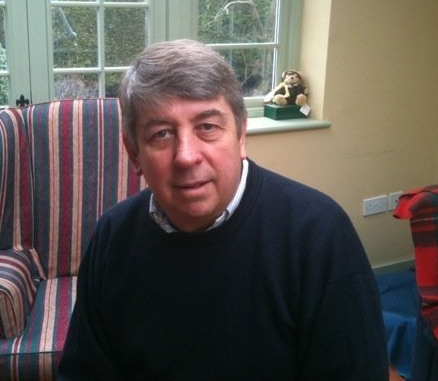Peter Philpott - the teacher and coach
Rowan McGregor | May 07, 2023
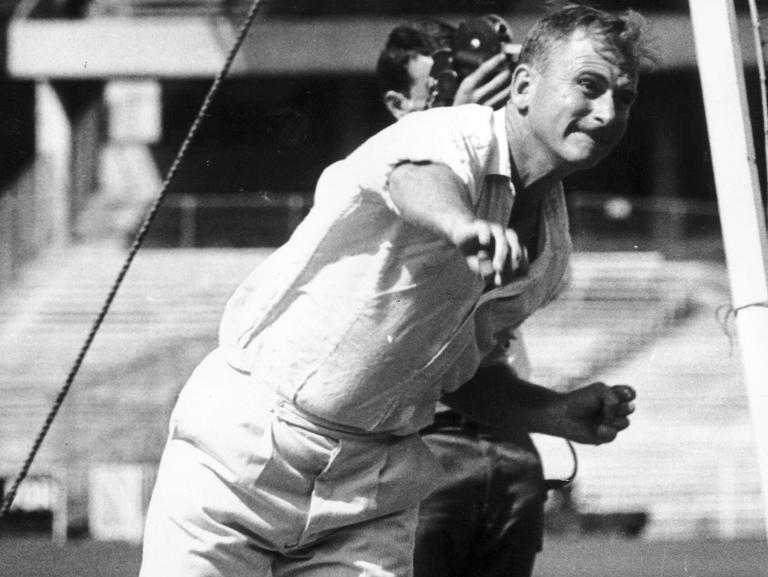
The following piece is purely a personal reflection. This is not an obituary, with all of Peter's life and achievements nicely wrapped up. If you want to know chapter and verse about his life, his book Two Times Thirty-Five, My Double Life will tell all. The title refers to his childhood illness that led doctors to believe he would be lucky in life to reach the age of 35. When he wrote the book he had more than doubled that age, and was still going strong.
He was a man that positively affected the lives, sporting endeavours, and academic pursuits of so many. Including me. I was already a cricket tragic when I met him. So I was subsequently a sponge that just lapped up everything he said. I confess that I did have a few disagreements with him over the years, even at our last meeting 5 or 6 years ago. They weren't overly serious and were forgotten by the next time we met. Life in his mind and experience was too short.
The death of 3 greats of Australian cricket in the past couple of weeks has been a bitter pill to swallow. Alan Davidson's career finished before I hit my stride as a cricket follower. I heard him speak and even met him a few times; he was a lovely man, so committed and passionate about the game. I last saw him at a Northern District Special lunch, where they presented the players who had played 1st Grade their numbers in chronological order. This was the club we both started our grade careers with. His career was a good deal more successful than mine I hasten to add.
Ashley Mallett played through the Chappell era, and much of his career I listened to on the radio. Someone I never met, but certainly admired. I have some of his books including his one on Trumper. 'Rowdy' (as he was known) was born in Chatswood – I wonder if that inspired him to write about the great man? Chatswood Oval is the home of the Gordon DCC where Trumper finished his playing days, and where the Trumper Pavilion stands.
They say it comes in threes, and so the heaviest blow for me and many of my school friends was the loss of our former coach and teacher, Peter Philpott. The first time I saw Peter Philpott he was playing for Australia in Melbourne, where we were living at the time, against England in the Second Test of 1965/66. (That game confirmed Doug Walters as my instant hero. Scoring 155 in his debut Test three weeks previously, then he followed it up with another century in this second Test. At only 19 years of age.)
I took note of all the Australian players, but Peter Philpott's name stuck in my mind as it was a tad unusual, and I took note of him every time I saw him on TV. Once I watched him bowl from the camera end for a long time, which gave a better look at what the ball was doing. I found it fascinating, and practiced leg spin bowling whenever and wherever I could. My leg spinning career was however quite short.
Starting at Shore School in Sydney in February, 1969, I was excited about a whole range of things. Being obsessed by cricket, I was delighted to be - on only the second day - into cricket trials on actual turf wicket nets. This seemed beyond a dream. My Dad had played on turf wickets and I'd seen them close up as I attended all his games, but I'd never seen a turf practice wicket and nets.
Another great excitement for me, as a cricket tragic, was to see an actual ex Test cricketer walking around the school. Peter Philpott. Always smiling, saying hello, and exchanging banter with boys as he passed them. He didn't teach me, so I had no contact in the early days with 'Charlie' as we called him. (He'd apparently called boys he didn't know 'Charlie' in his early years but had stopped doing it when it became his nickname. I was completely unaware of his nickname outside the school - 'Percy'.)
But I didn't have to wait long. Cricket finished, and we were into a fierce rugby term, with the School's Headmaster BH (Jika) Travers, a former Rugby International. Either you played Rugby, or had to have a very good reason not to. I was spoiled in my first year; the 1st XI won the Premiership for the first time in 17 years, and then, with Jika as coach, the 1st XV won the first Rugby Premiership for the school since 1933. To my surprise I discovered that Peter Philpott was one of the school's top Rugby coaches, looking after the developing U15A's and B'S. Something that often gets overlooked when his coaching career is discussed.
And into third term, cricket season again. And this time, as the U14A's, we were to be coached by Peter Philpott. Still playing brilliantly at 1st Grade level he would conduct our game on Saturday mornings and then dash to wherever Manly were playing - sometimes leaving a little early. Jika had discouraged him from more 1st class cricket to concentrate on his teaching, something that seemed to grate when he wrote about it in a book years later. He also appeared on Rex Mossop's Channel 7 WOS on Sundays talking about Rugby in the winter, and cricket in the summer. Our coach was not only a former Test player, but also a TV star.
I heard him quoted as saying that coaching and umpiring in the morning with us helped his own cricket. He would be 'seeing' the ball beautifully when he was playing in the afternoon. And he'd conducted our fielding warm ups hitting the ball, so was nicely primed. But it was at the mid-week practice sessions that he shone. Being a natural teacher, he would be telling and showing you aspects of the game that he could put across so well. He was obviously more in his element with bowlers, particularly spinners. But constantly practising fielding, whatever the weather, made for some very tough and competent fielding teams. In my time at school we won 4 out of 6 cricket premierships. And while he only directly coached one of them (Phil Emery's dad Neville coached the other three) he had a huge influence on the development on most of the players in those teams.
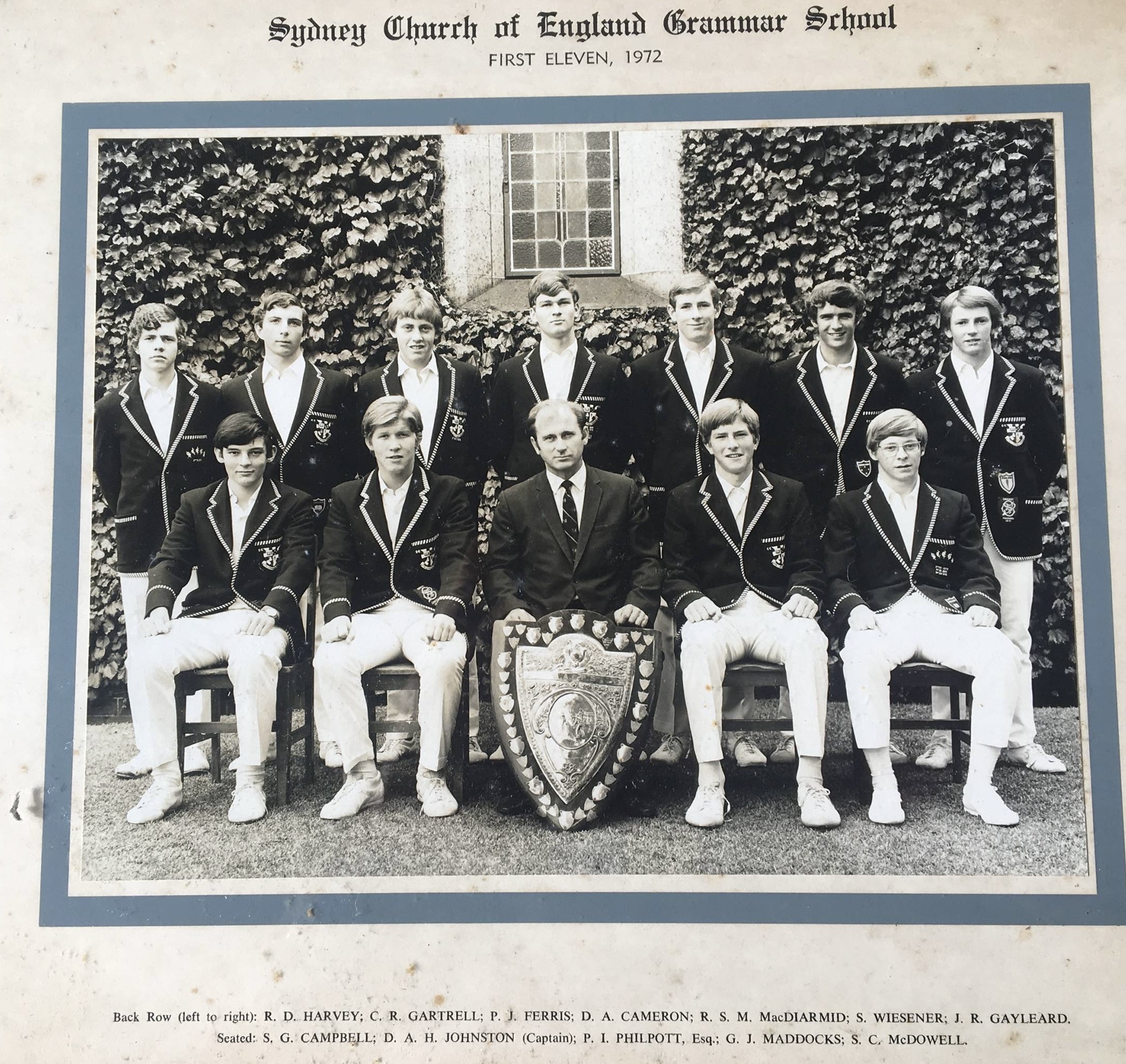
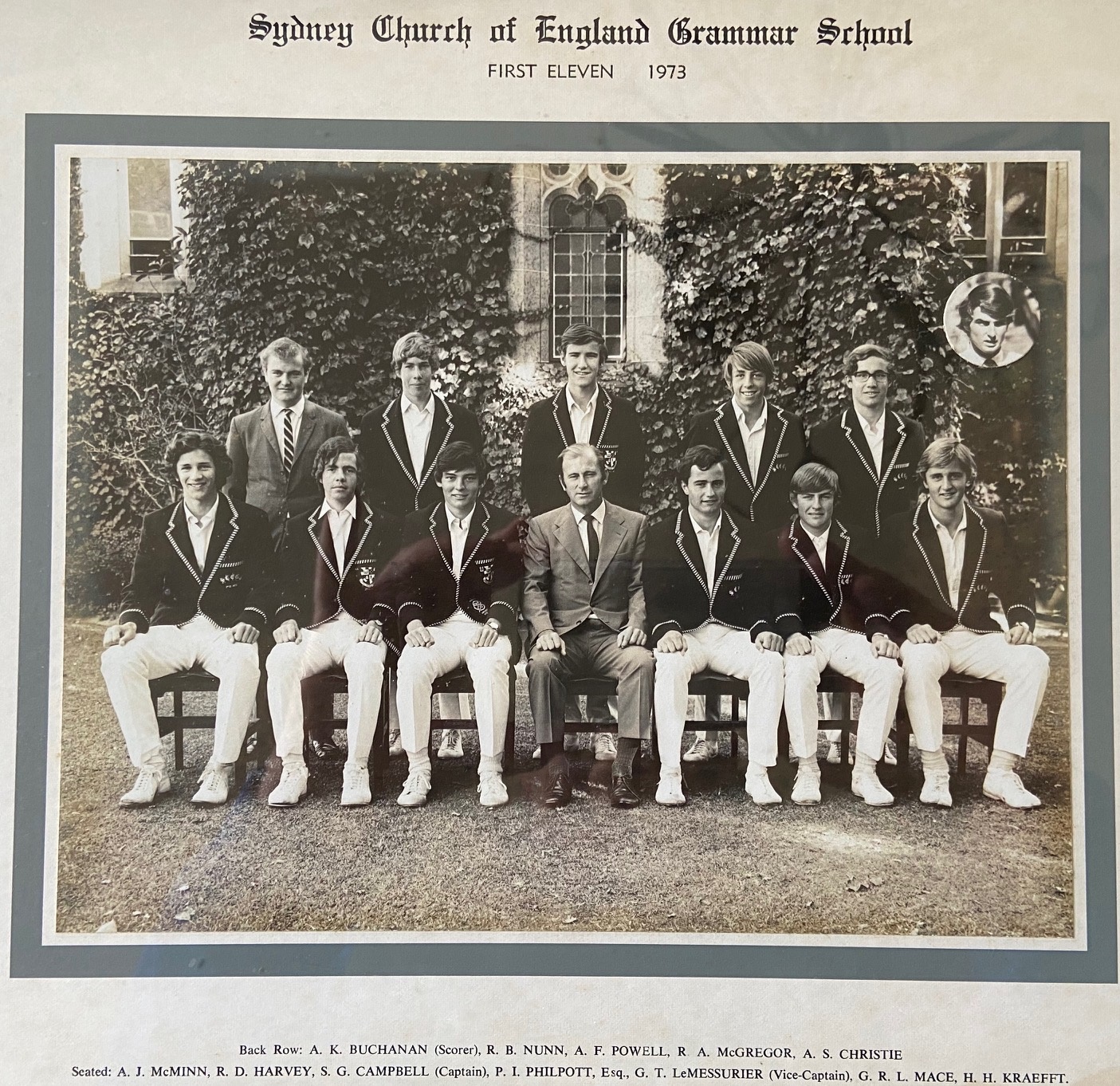
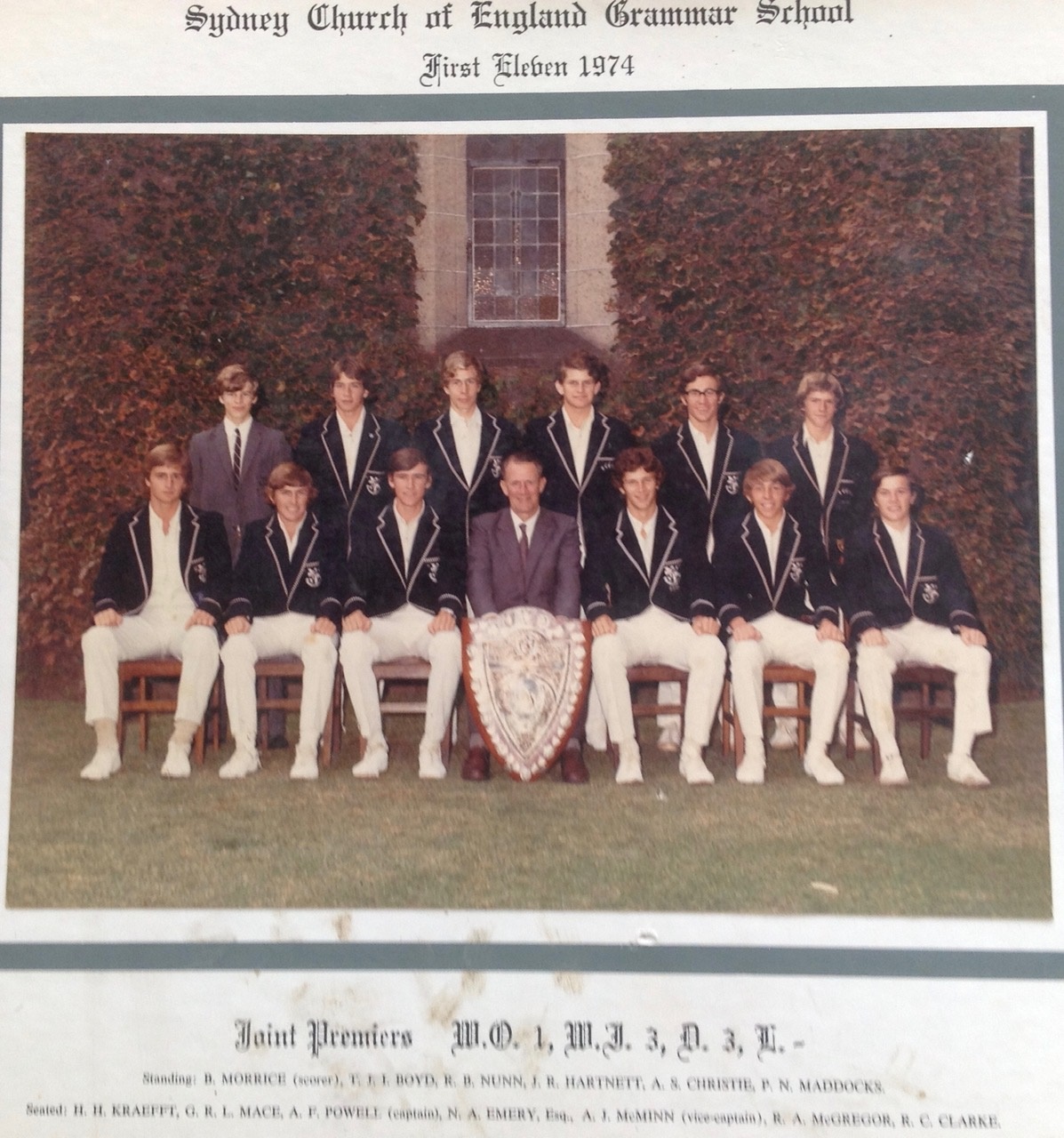
Peter had spent time in South Africa in the early 60's, and brought back some fielding games and drills that were brutal both physically and mentally. He told us that we would be a better fielding outfit than the Test team, because we would spend more time on it. The Test team were part time of course, and only came together a day or two before games. We would be practicing fielding at least 2 or 3 afternoons a week, and sometimes did catching at lunchtimes on the school oval.
In our last year, when we won the Premiership, fielding was probably the main reason for our success. We created pressure. Got run outs, and hardly dropped a catch. One of his favourite drills was getting the guy with the best arm in the team to throw balls as hard as he could at 'Charlie', and he would guide, cut, nick them at high pace into a slip cordon. Wet weather or dry...didn't matter. I lived those years with my hands virtually dyed red. He would never call off a practice because it was wet.
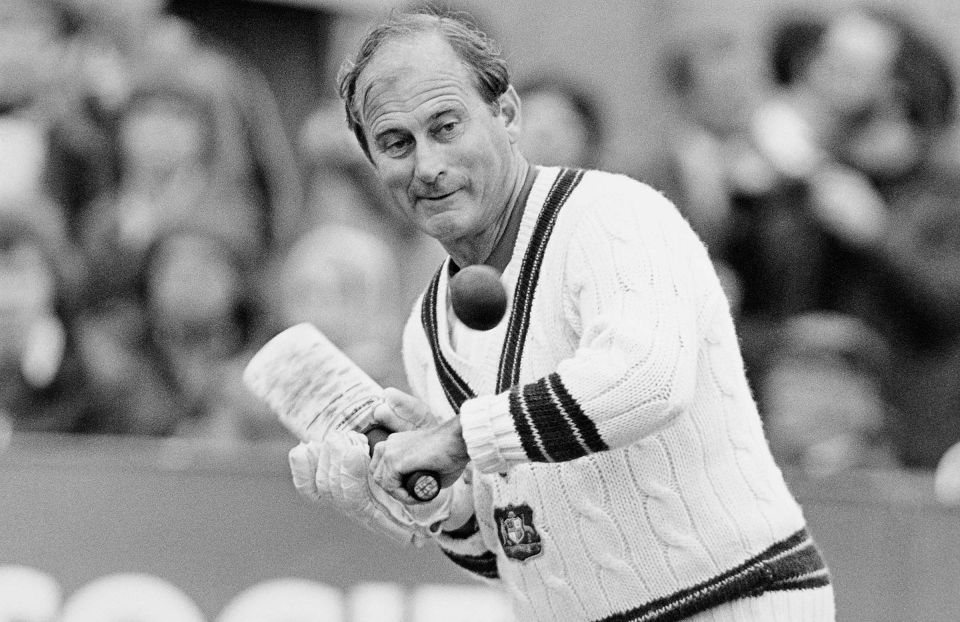
Peter Philpott conducting a slips catching training session
We would get into rugby gear and would be throwing ourselves around slipping and sliding in the wet and mud playing cricket/hockey or forcing back games. If you were slightly afraid of cricket balls you were soon found out. And he created tough fielding outfits that developed confidence due to the work put in. That confidence flowed into other parts of the game. Not that I became the world's best fielder, but I caught over the years most things that came my way or threw myself around stopping balls. All because of that coaching.
If rain got too much, again he wouldn't send us on our way. Under the school assembly hall was a big paved area that he would gather us in, and do a masterclass on spin bowling. 'Blokes' he would begin. Not fellas, or guys, or boys. 'Blokes'. He would do a full leg spinner, half leg spinner, top spinner, half wrong 'un, full wrong 'un, flipper, and for good measure the Johnny Gleeson/Jack Iverson mystery spinning ball. I don't remember the zooter back in those days..... perhaps that came later. The finger spinner wouldn't get much of a look in.
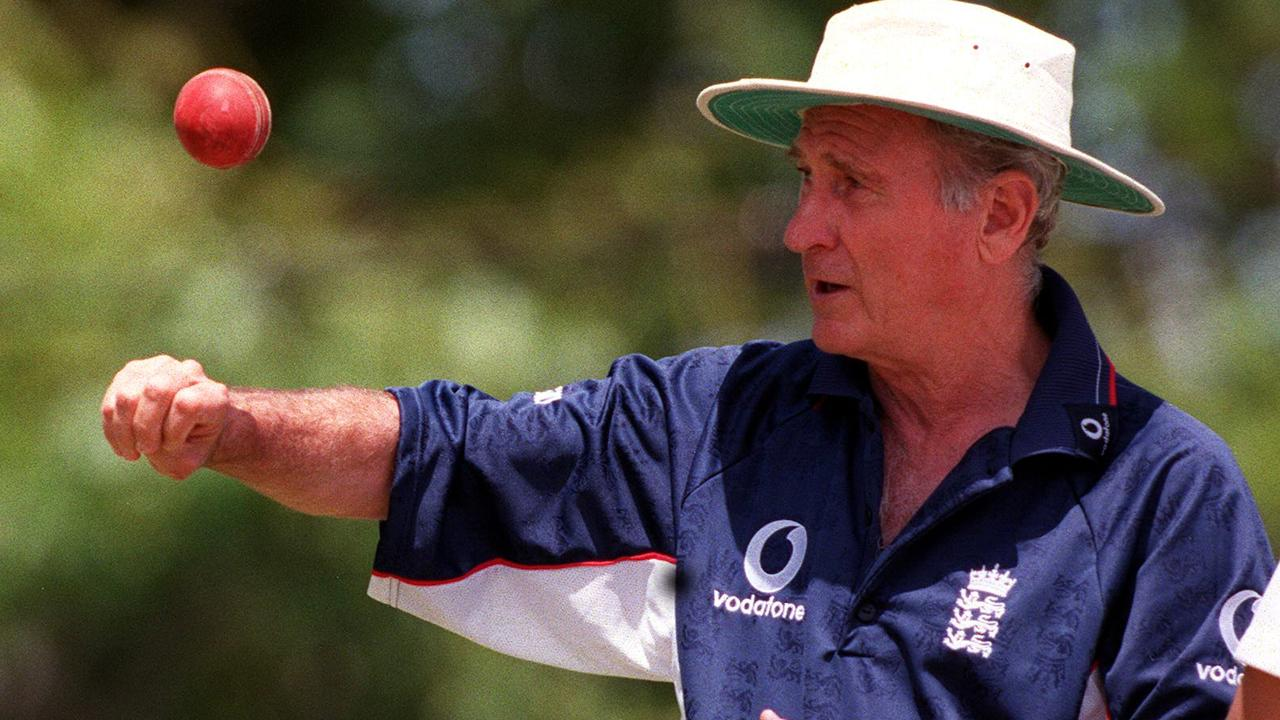
Peter Philpott spinning it up
Having said that, he taught two finger spinners in our team everything he knew, both becoming highly effective bowlers. How to be accurate, putting a handkerchief down on the correct length. How to bowl an arm ball. How to hide it. Changes of pace, length, flight. How to build rhythm in the run up. He reckoned each run up was like a song, or tune. You should get your own tune and hum it to yourself during practice sessions as you ran in to bowl.
Looking back, I can see that it was in all these sessions that he was working out the routines and themes that then became famous at the seminars and coaching sessions he did in later years. And material for his books. We, and all his other school teams, were guinea pigs for his later years of coaching State sides and international teams. By then there wasn't much he hadn't seen. Not many methods of coaching he hadn't tried. He knew what worked and what didn't.
He coached our pace bowlers the basics and was strong from my memory on the rhythm of the run up, the mechanics of swing and cut. Of bowling to your field. He advised and coached a succession of very good wicketkeepers; having relied on some very good glovemen for all catches and stumping’s taken from his bowling over the years, he valued that man greatly. I don't remember him coaching much about the technicalities of batting. Getting a start, going on with an innings, taking responsibility, were all emphasised.
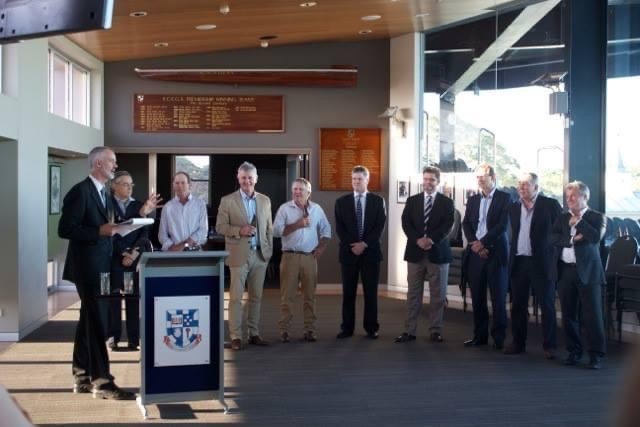
Shore School 2014 - the 1974 team presenting caps the First and Second XI. Introduced by the Master in Charge of Cricket Richard Stobo, former NSW Shield player and appropriately in the Neville Emery Room, our coach that year. The team Charlie started to build in 1972.
These days some coaches can be termed 'Team' coaches, and then others have a specialisation. Charlie was a very good 'Team' coach. Motivation, tactics, field placings, pressure. In my two years he told me one thing about my batting. He felt I used too much bottom hand, and not enough top hand. He used Greg Chappell as an example. But he didn't explain why it was necessary to use more top hand.
Peter Philpott offered the problem, not the solution. I pretty much ignored it to start with, scoring runs at the time. But the critique stayed with me. I'm 66 now, and I still think about what he told me as a 14 year old. I eventually found the answer myself. At games - if I wasn't batting – I would walk around with a bat only using my top hand in shadowing shots. Whether he'd meant me to find out myself, or genuinely didn't quite know how to explain it, I don't know. Modern coaching courses don't advocate that approach.
Despite him being a successful batsman, at his heart he was a bowler, and a leg spinner at that. He'd be down with the bowlers in the nets, or at Centre wicket practices telling them how to get you out. Not up the batting end, telling me how to defend or attack. When I started in 1st Grade in Sydney most teams had a wrist spinner. The benefit for me was that, thanks to Peter, I knew their armoury. I knew what they were trying to do.
That didn't mean I didn't have a devil of a job facing the likes of David Hourn and Peter Ferguson (the left-armers of the species). Or Ro Shelton on a damp wicket, or Geoff Davies on a dry one. Or Steve Campbell (coached by Peter), a dual Premiership player with UNSW and Shore's Captain in 1973. Or Peter Maloney, John Todd, Chris Elder, Mick Murfin or, later, Tom Shiner. But after the years of Peter Philpott 'Master Classes', I had a clue at least.
After the 1973 season Peter left us to embark on his next adventure, in partnership with Greg Chappell - a Cricket School in Brisbane. I reflected on his coaching when I embarked on my own coaching career years later. I used some of his fielding drills from all those years ago; I worked out that either my new charges were slightly timid, or I should pay more due to Health and Safety concerns. The close order forcing back game nearly resulted in injury. And my description of batsmen who got out when set wasn't quite as vivid as my old coach. Times change.
I had a succession of leg-spinners in my Oxfordshire U14 squad, who benefited from my remembering much of what Peter had told us. I even bought his famous book 'The Art of Wrist spin bowling', probably the best book on the subject ever written. I still had a couple of questions, so on a trip back to Sydney from England, I took him to lunch. Despite a couple of minor disagreements a very convivial lunch took place at the Oaks Hotel in Neutral Bay.
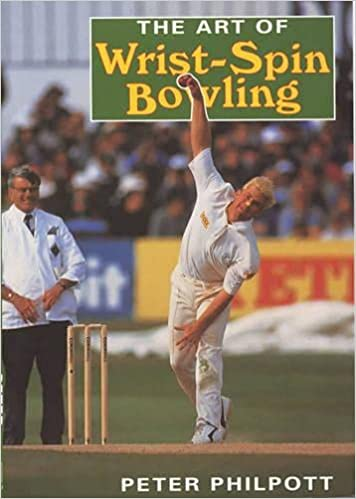
I insisted on driving him back to where he lived in Mosman, and he insisted I come up to his apartment to collect a book of his he'd written and mentioned me in. As I was about to leave, my questions on leg spin suddenly occurred to me. So in the corridor between his flat and the lift, my 80 year old ex-coach was giving me a master class on the delivery angle of the arm, and the movement of the whole body to impart maximum spin. He pretty much did his full run up, and demonstrated the necessary positions. I couldn't believe my eyes, but I was also left in no doubt what and how I had to coach my own leg-spinners when I got back to the UK.
I didn't see nearly enough of Peter in the last 25 years or so. One meeting I do recall, bizarrely, was on the street in downtown Perth. Quite what he was doing there in 1988 I don't remember, perhaps coming back from Sri Lanka where he did quite a bit of coaching.
He asked me how I was going, and after some in depth questioning he ascertained I was working there, and still playing cricket. I was Captain of Claremont Cottesloe 1st Grade, batting well, but unable to convert good starts. The look on his face was well known to me. He was wrestling with a cricket problem, and was framing his answer for me, probably accompanied by hand gestures, and imitating cricket movements.
As he lined up his advice I was conscious of being accompanied by a client, and we were off to a meeting that we were becoming late for. I sadly had to cut short our street side coaching session, and I never did get that pearl of wisdom. Then nearly a decade later I was sitting at my desk in Hong Kong and the phone rang with Peter Philpott calling from England. He was coaching at Rossall School in the North, and was bringing a squad of players to Australia via Hong Kong. He wanted games and possible accommodation help. Unfortunately I was leaving there myself not long after, but furnished him with a few contacts.
And that's how I will remember him. When anything about cricket came into view, he was in his element. His energetic, inspiring and enthusiastic coaching had at its heart a great technical knowledge. Fortunately, his teaching skills and experience allowed him to impart a great deal of necessary information to an untold number of cricketers around the world. He was also an exceptional academic teacher of English and history, and had a profound effect on sporting and non-sporting pupils alike. He didn’t really play favourites, but if you bowled leg-spinners you would be close to getting his nod. He advocated you work hard, have pride in what you do, be competitive, and have fun. A pretty decent legacy to the game we love.
Vale Peter/Percy/ Charlie.








